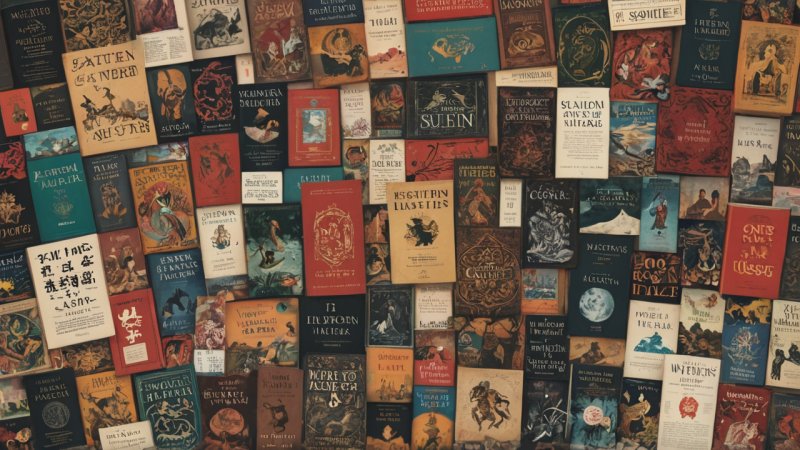Culture plays an essential role in shaping fiction narratives, influencing authors’ perspectives, themes, and character development. This article explores the differences and similarities in how Western and Eastern literature reflects their respective cultures, ultimately affecting the narratives they convey. By examining distinct genres, thematic elements, and narrative styles, we can better understand the impact of cultural contexts on fiction.
Understanding Cultural Contexts
Culture encompasses the beliefs, values, norms, and practices of a society, and it significantly influences literature. Western literature often emphasizes individualism, freedom, and self-expression, drawing from the Enlightenment and Romantic movements. In contrast, Eastern literature frequently highlights collectivism, harmony, and the interconnectedness of life, rooted in philosophies such as Confucianism and Buddhism.
Western Literature: Individualism and Personal Journey
Western narratives often center on the individual’s journey, exploring themes of identity, self-discovery, and personal conflict. Classic novels like F. Scott Fitzgerald's The Great Gatsby and Herman Melville's Moby Dick illustrate the struggle for personal fulfillment against societal expectations.
Pros:
- Character Development: Western literature often features complex characters who evolve throughout the story, offering readers deep insights into their motivations and struggles.
- Thematic Depth: Themes of individualism, ambition, and existentialism resonate with readers, encouraging personal reflection.
Cons:
- Narrow Focus: The emphasis on the individual can sometimes result in a lack of attention to the community or broader social issues.
- Predictability: The archetype of the hero’s journey can lead to predictable plot structures in some Western narratives.
Eastern Literature: Collectivism and Harmony
In contrast, Eastern literature often focuses on the collective experience, exploring themes of family, community, and social responsibility. Works like Haruki Murakami's Norwegian Wood and the classic Chinese novel Dream of the Red Chamber delve into the intricacies of relationships and the impact of societal norms on personal lives.
Pros:
- Community Focus: Eastern narratives offer rich explorations of family dynamics, social hierarchies, and cultural traditions.
- Philosophical Insights: Many Eastern works incorporate philosophical elements that promote introspection and a deeper understanding of life.
Cons:
- Less Individual Focus: The emphasis on collectivism may result in characters that feel less developed as individuals.
- Complexity of Themes: The intricate social and cultural contexts can sometimes make Eastern literature less accessible to Western readers.
Genre Differences: Fictional Forms and Cultural Reflection
The genres prevalent in Western and Eastern literature also reflect cultural values. In the West, genres such as the novel, drama, and poetry have evolved distinctly, often focusing on personal narratives and existential themes. Conversely, Eastern literature frequently embraces forms such as fables, folklore, and poetry that emphasize moral lessons and communal values.
Western Genres: Novels and Drama
Western fiction has a robust tradition of the novel, with various sub-genres that explore different aspects of human experience, including romance, science fiction, and historical narratives. Plays by authors like Shakespeare and Arthur Miller often delve into individual struggles against societal pressures.
Eastern Genres: Fables and Folklore
In Eastern literature, storytelling often takes the form of fables and folklore, emphasizing morals and lessons that reflect the values of community and tradition. The Arabian Nights is a prime example, serving both to entertain and to impart wisdom.
Narrative Styles: Voice and Perspective
The narrative styles employed in Western and Eastern literature further illustrate the cultural distinctions. Western authors often employ first-person or third-person limited perspectives that allow for deep character introspection. Eastern authors frequently utilize omniscient narration, providing a broader view of the societal context and collective experiences.
Western Narrative Techniques
Western narratives often engage readers through a personal voice that invites them to connect intimately with the protagonist's thoughts and feelings. This technique fosters empathy and personal connection.
Eastern Narrative Techniques
In contrast, Eastern narratives often utilize a detached voice that emphasizes the collective rather than the individual. This perspective allows readers to see characters as part of a larger tapestry of life, reflecting the interconnectedness of human experiences.
Conclusion: Bridging Cultures Through Literature
Both Western and Eastern literature offer valuable insights into the human experience, shaped significantly by their cultural contexts. While Western narratives often focus on individualism and personal journeys, Eastern literature emphasizes collectivism and the interconnectedness of life. Readers can benefit from exploring both traditions, as each provides a unique lens through which to understand diverse human experiences. Ultimately, literature serves as a bridge to foster empathy and appreciation for different cultural narratives, enriching our understanding of the world.






